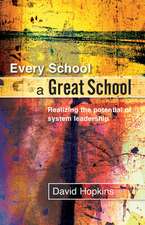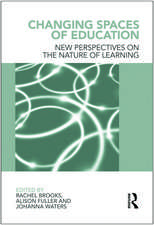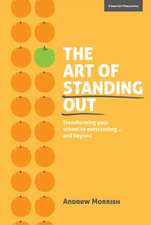Ideologies in Educational Administration and Leadership
Editat de Eugenie Samieren Limba Engleză Hardback – 5 mai 2016
The first section, Philosophical and Theoretical Foundations, includes a range of sociological, political and linguistic approaches to examining ideology in an educational context. The second section, Ideologies of Research and Teaching, includes examinations of neoliberal and technological effects on research and teaching, as well as ideological shifts and challenges, in the West and in Eastern Europe. The last section, Contemporary and International Issues, includes critiques of social media, neoliberal impact on schooling, managerial leadership, university ideologies in Finland, the rationalisation of universities, and the impact of administrative ideologies on school systems.
The book will appeal to researchers, practitioners, policy-makers, academics, as well as post-graduates in educational administration theory, and related courses in the ethics and politics of education, educational leadership, and organisational studies.
Preț: 1057.89 lei
Preț vechi: 1290.10 lei
-18% Nou
Puncte Express: 1587
Preț estimativ în valută:
202.43€ • 220.57$ • 170.57£
202.43€ • 220.57$ • 170.57£
Carte tipărită la comandă
Livrare economică 23 aprilie-07 mai
Preluare comenzi: 021 569.72.76
Specificații
ISBN-13: 9781138958586
ISBN-10: 1138958581
Pagini: 260
Ilustrații: 7
Dimensiuni: 156 x 234 mm
Greutate: 0.54 kg
Ediția:1
Editura: Taylor & Francis
Colecția Routledge
Locul publicării:Oxford, United Kingdom
ISBN-10: 1138958581
Pagini: 260
Ilustrații: 7
Dimensiuni: 156 x 234 mm
Greutate: 0.54 kg
Ediția:1
Editura: Taylor & Francis
Colecția Routledge
Locul publicării:Oxford, United Kingdom
Public țintă
Postgraduate, Professional, and UndergraduateCuprins
Editor’s Introduction: Ideologies that Maintain and Constrain Eugenie A. Samier PART I: Philosophical and theoretical foundations 1 The ideology of skills and its implications for socially progressive learning in university cooperative education: Student and administrator perspectives Peter Milley 2 Against ideology: Democracy and the human interaction sphere Philip A. Woods 3 Language ideology in the discourse of educational leadership Yasemin Yildiz 4 Discourses and contexts of educational leadership: From ideology to dispositive Roberto Serpieri PART II: Ideologies of research and teaching 5 The contradictions of academic capitalism: The case of the Estonian R&D system Erkki Karo, Rainer Kattel and Ringa Raudla 6 Teachers’ work in times of ideological and philosophical uncertainty in post—Soviet Ukraine Benjamin Kutsyuruba 7 Technology as ideology: Clearing an educational path between ‘reason and experience’ Carol E. Harris PART III: Contemporary and international issues 8 Thought leadership: Social media and leadership in an information--based society Read M. Diket and Sheri R. Klein 9 Critical perspectives on educational leadership in the context of the march of neoliberalism John Smyth 10 Demythologising ‘leadership’: The Trojan horse of managerialism Scott Eacott 11 Rhetorical topoi of academic ideology: Examining university strategies in the northeastern European extreme of the Humboldtian tradition Pertti Ahonen 12 Constructing universities as organisations: University reforms in Poland in the light of institutional theory Marek Kwiek 13 Decentralisation of education management and school leadership: The effects of public management reform ideologies Algirdas Monkevičius and Jolanta Urbanovič Index
Notă biografică
Eugenie A. Samier is Director of Liberal Arts at the Royal University for Women, Kingdom of Bahrain.
Descriere
Ideologies in Educational Administration and Leadership explores ideological dimensions of educational administration in a number of Western, Central European and Middle Eastern contexts as they influence or shape the understanding, analysis, and practice in the field covering a broad range of topics, such as ethics, governance, diversity, and power.
It will appeal to policy-makers, academics, as well as post-graduates in educational administration theory, and related courses in the ethics and politics of education, educational leadership, and organisational studies.
It will appeal to policy-makers, academics, as well as post-graduates in educational administration theory, and related courses in the ethics and politics of education, educational leadership, and organisational studies.














